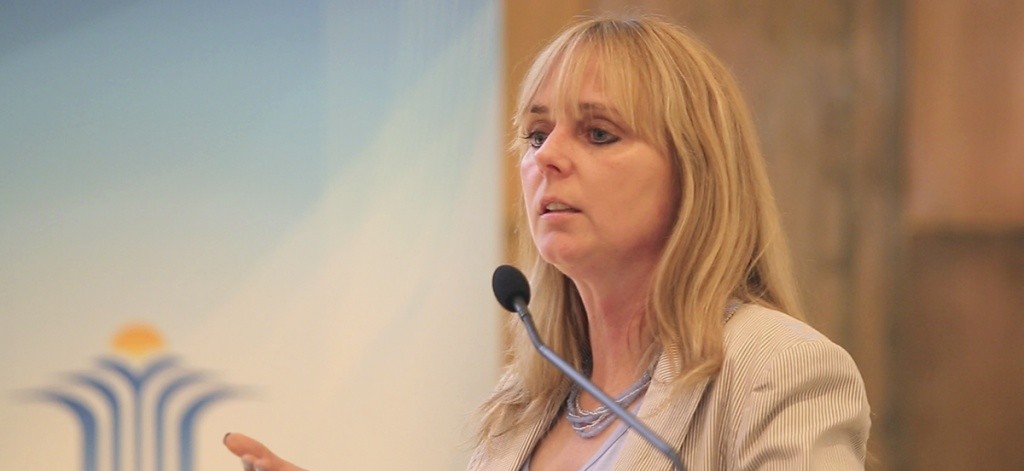The views and opinions expressed on the website are those of the authors and do not necessarily reflect the views or opinions of Niagara Foundation, its staff, other authors, members, partners, or sponsors.
By Alexandra Turcios
Center for Public and Global Affairs Intern
August 4, 2015
On Wednesday, July 8 keynote speaker, Mari Gallagher, gave a didactic speech on food insecurity at the Sharing the Faith:: Ramadan Experience event. Gallagher is a local food expert who has conducted breakthrough research on the Chicago food deserts and its impact on public health. Her research has gained national recognition and was featured in the New York Times Magazine and Time. In addition to this, Gallagher has contributed to the Huffington Post, Wall Street Journal, The Economist and NPR on issues relating to food sovereignty and access. Gallagher’s distinguished background allowed her to paint poverty in a new light.
In the land of plenty, hunger is incredibly pervasive. “50 million people either experience severe hunger or some form of hunger–and some of it is cyclical” Gallagher said. While these numbers are staggering, Gallagher claims that it is likely higher. “There’s a lot of shame with hunger. Often, the numbers of those who are hungry are underreported.” “As many as 77% of U.S. workers live paycheck to paycheck” Gallagher said. This results in high levels of uncertainty and a lack of economic sovereignty. If one unexpectedly loses a job, there is an increase in food insecurity. There are several safety nets for Americans who struggle with hunger, but the reality is that such assistance is not adequate for eradicating hunger. Despite programs like SNAP, many people are still persistently in hunger. Poverty is often the axis of hunger and malnutrition. Even with SNAP in place, Americans opt for cheaper–unhealthy– food sources, some of which lack essential nutrients that provide vitality and sustenance. Healthy food alternatives are not accessible in areas where food deserts prevail. “Here, on the southside of Chicago, we have food deserts” Gallagher commented. The geographic and financial access to quality food is narrow for impoverished communities. While there is a robust and plentiful food channel in Chicago, Gallagher said “it’s not always a calorie problem, it’s a nutrient problem.”
Some experience such hunger or malnutrition on a semi-permanent basis in a country where 40% of food is thrown away because it does not meet market standards. In an abounding food system, “some of this abundance goes to waste” Gallagher said. “We have great capacity to produce food and to reach people.” “We are all many different people, of many different faiths, of many different ages” Gallagher said, “[whose] abilities can manifest” to combat hunger. Focusing on an intergenerational model to repair broken food links is vital for society. “[Food] has a cultural and spiritual significance” Gallagher said. Eating is a spiritual activity, but we are less aware of the origin of the food we consume. Historically, food systems have been primarily local. But, with the emergence of global food systems “so much of our food today has so many miles on it and we’ve become very distant from our food sources” Gallagher said. We’ve lost the intimate food sources once rejoiced, and it may be time to better acquaint ourselves with where our food comes from. “The food environment does matter” Gallagher said, “[We must] revisit hunger, diabetes, and obesity.” By revisiting such topics “we can not only end hunger, but we can improve quality and length of life” Gallagher said. “Food is something that unites all of us. There’s not a person on the planet who doesn’t need food to survive.”
With the closing of the holy month of Ramadan, a time to abstain from earthly pleasures and to reflect on past sin, let us take a moment to acknowledge those in perpetual hunger. Ramadan is filled with religious zeal, but most importantly, it is a transcendental experience that allows us to internalize a truly empathetic, compassionate understanding of those who face permanent hunger. We have a spiritual and moral imperative to acknowledge food insecurity. “In this time of fasting, it is a time to reflect and to also purify your body and have gratitude” Gallagher said.
On behalf of the Niagara Foundation, we would like to thank Mari Gallagher for joining us on such a special occasion.

